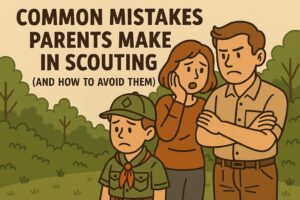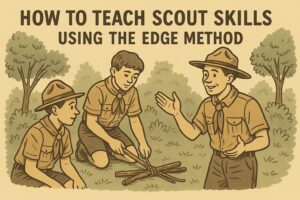Scouting is a unique journey where youth grow into leaders, learn life skills, and earn achievements like the prestigious Eagle Scout rank. Parents play a vital role in supporting their children—but even with the best intentions, it’s easy to make missteps that can slow progress or reduce the Scout’s ownership of the experience.
In this post, we’ll break down the most common mistakes parents make in Scouting, and how to support your Scout in a way that empowers—not hinders—their success.
1. Doing the Work For the Scout
Perhaps the most frequent issue: well-meaning parents completing requirements, writing project plans, or tracking advancement on behalf of their child. Scouting is built around youth-led responsibility. When parents take over, Scouts lose the chance to learn, grow, and take ownership.
What to do instead: Ask guiding questions like, “What’s your plan to finish this requirement?” or “Who do you need to talk to about that?”
2. Speaking for the Scout at Meetings and Boards
Whether at a Scoutmaster conference, Board of Review, or troop meeting, it’s crucial that Scouts speak for themselves. When a parent dominates the conversation, leaders can’t assess the Scout’s growth, confidence, or leadership.
How to help: Practice with your Scout at home, but let them be the voice in official settings.
3. Micromanaging the Scout’s Advancement Timeline
Some parents push too hard to get their child to Eagle by a certain age, which can backfire. Scouts develop at different paces, and rushing can lead to burnout or disinterest.
Better approach: Set broad goals, encourage steady progress, but let your Scout choose how and when to pursue certain merit badges or leadership positions.
4. Not Letting the Scout Lead (Especially in Troop Roles)
If your Scout is a Patrol Leader or Senior Patrol Leader, they’re expected to lead their peers—not have a parent call the shots behind the scenes.
What to do instead: Step back. Leadership means making mistakes and learning from them.
5. Focusing Too Much on Badges Instead of Growth
While merit badges and ranks are important, they’re not the only measure of success in Scouting. Some parents worry if their child doesn’t earn every badge quickly—but forget that character, resilience, and independence matter more in the long run.
What matters more: Is your Scout growing as a person? Are they becoming more responsible, kind, and confident?
6. Not Staying Informed or Involved at All
On the other side of the spectrum, some parents stay too disconnected, missing emails, not attending Courts of Honor, or avoiding leadership roles. This leaves Scouts unsupported.
Find a balance: You don’t need to be the Scoutmaster—but being engaged and present helps Scouts succeed.
7. Pressuring the Scout During the Eagle Project
The Eagle Scout service project is a huge milestone—and also a major source of tension when parents take over. Scouts should be the ones communicating with sponsors, planning logistics, and leading volunteers.
How to help: Serve as a mentor, not a manager. Let your Scout own the project, even if it takes longer.
Final Thoughts
Scouting is designed to challenge young people to lead, learn, and grow. Parents are a vital part of that journey—but the key is to support without overshadowing. By avoiding the common mistakes above, you’ll help your Scout gain confidence, earn their achievements the right way, and truly enjoy the path to Eagle.




